英汉语言对比-练习题-2-reference answers
英汉语言对比-习题·+答案

英汉语言对比-习题·+答案预览说明:预览图片所展示的格式为文档的源格式展示,下载源文件没有水印,内容可编辑和复制英汉语言对比Synthetic vs. AnalyticⅠ. Answer QuestionsDirections: Answer the Questions in English briefly, with examples if necessary. 1.What are synthetic languages(综合语)? How are they characterized?According to Webster’s Ninth New Collegiate Dictionary, A synthetic language is “Characterized by frequent and systematic use of inflected forms to express grammatical relationship s”2.What are analytical languages(分析语)? How are they characterized?According to The Random House College Dictionary, An analytic language is “Characterized by a relatively frequent use of function words, auxiliary verbs and changes in words order to expr ess syntactic relations, rather than of inflected forms”.3.Why English language is more flexible in word order(语序)? Why is it not so inChinese?Because word order is more connected with the formal changes. If the form change is more flexible, the word order is more flexible. Chinese language is an analytic language, the word order cannot be change at random, in which the relationship between the words are closely related with word order and function words.4.What is the usual word order in English sentences? Whatare the nine types ofinversion in English sentences?The usual word order in English sentence is Subject-Verb-Object. The nine types of inversion in English sentences include: interrogative inversion, imperative inversion, exclamatory inversion, hypothetical inversion, balance inversion, link inversion, signpost inversion, negative inversion, metrical inversion.1. 5.What are the E—C differences in formal words(形式词)?English language is featured in its abundant function words, of which is article. Articles are frequent employed. To use an article or not, and to use a definite one or an indefinite one, makes great difference in expression of meaning. Auxiliary are more frequently used in Chinese. Chinese language contains auxiliary for tense, structural and mood. This last category is especially unique in the language for the richness for delineation of emotions, like the letters 呀、啦、哦、嘛、呢,and others.6.How many kinds of formal words (形式词)are there in English language?2.There are five types of formal words, that is:i.article, including a, an, and the;ii.preposition, like on, in, to, for, as, at, of, with, from, across, etc.;iii.auxiliary verb, like will, do, have;iv.coordinator, including and, but, or;subordinator, like unless, after, for, due to, etc.7.Why Chinese is called Tone Language(声调语言)?Chinese tone can be used for indicating the change of meaning and is not suitable for expressing the certainty, completeness, independence or finality.Ⅱ. Fill in the BlanksDirections: Fill in the blanks with the best answer you have found in the textbook.1.11.综合语的特征是经常性、系统性的运用曲折形式来表现语法关系为特征的语言,分析语的特征是分析语的特征是相对频繁地使用功能词,助词和改变词序来表达句法关系,而不用曲折形式来表达。
新英汉翻译教程 第三章.英汉语言对比答案

小节结束
16 返回章重点 退出
3. 1. 3 英语爱用静态词,汉语常用动态词
英语喜欢使用静态词汇,而汉语则 多使用动态词汇,英译汉时常常把原文 中表示动作意义的静态叙述转换成汉语 的动态叙述。
第 三 章 重 点
3. 2 英汉词汇表达对比
3.2.1 英语词汇含义多 3.2.2 英语词汇搭配多 3.2.3 英语词汇在句中的位置多
课堂互动2
3. 3 英汉句法结构对比
3.3.1 英汉句子结构的互换 A. 英语简单句可转换成汉语复合句 B. 英语并列句、复合句可转换成汉语简单句 3.3.2 英汉句子顺序的调整 A.调整时间顺序 B.调整空间顺序 课堂互动3 C.调整逻辑顺序
17 返回章重点 退出
例1:Inspiration is the number one cause of greatness. If information is power, then inspiration must be the power of our potential. The power that moves us from the systematic to the spontaneous. From ideas to results.
【译文】这时候,他从烤架上拿了些羊肉,庄重地送 到我们面前,我们各自取了一些,可是我们早已 没有了胃口,只不过做做样子,装吃罢了。
15 返回章重点 退出
例2:Harvard Business School opened in the early 20th century, and pioneered the casestudy method of teaching—making use of real-world scenarios, instead of relying on academic theory—a methodology that has remained the bases for many MBA programmes around the world today.
英汉语言对比练习

Chapter 1Ⅰ. Answer QuestionsDirections: Answer the Questions in English briefly, with examples if necessary.1. What are synthetic languages(综合语)? How are they characterized?2. What are analytical languages(分析语)? How are they characterized?3. How man formal changes are possible to English words? Is there any formal change(形态变化)in Chinese language?4. Why English language is more flexible is word order(语序)? Why is it not so in Chinese?5. What is the usual word order in English sentences? Which are the nine types of inversion in English sentences?6. What are the E—C differences in formal words(形式词)?7. How many kinds of formal words (形式词)are there in English language?8. How is English phonological system(语音系统) formed? How is Chinese one?9. Does Chinese phonological and characteristic system have any advantage in literary forms?10. Why Chinese is called Tone Language(声调语言)?Ⅱ. Fill in the BlanksDirections: Fill in the blanks with the best answer you have found in the textbook.11.综合语的特征是,分析语的特征是。
英汉互译英汉语言对比练习2
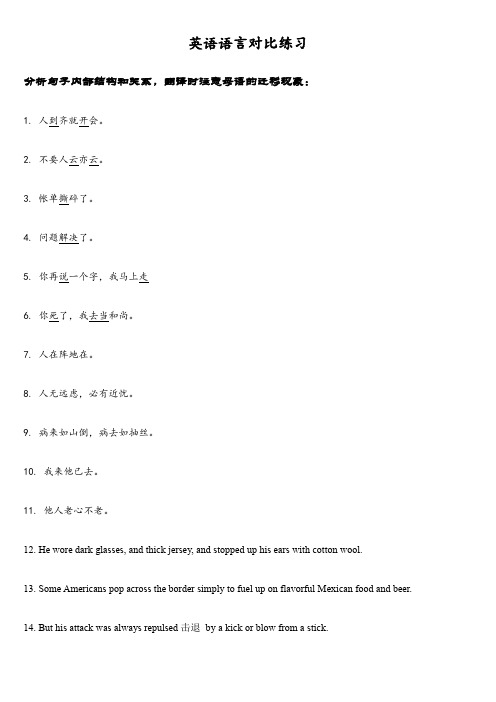
英语语言对比练习分析句子内部结构和关系,翻译时注意母语的迁移现象:1. 人到齐就开会。
2.不要人云亦云。
3. 帐单撕碎了。
4. 问题解决了。
5.你再说一个字,我马上走6. 你死了,我去当和尚。
7. 人在阵地在。
8. 人无远虑,必有近忧。
9. 病来如山倒,病去如抽丝。
10. 我来他已去。
11. 他人老心不老。
12. He wore dark glasses, and thick jersey, and stopped up his ears with cotton wool.13. Some Americans pop across the border simply to fuel up on flavorful Mexican food and beer.14. But his attack was always repulsed击退by a kick or blow from a stick.15. Kino hurrying towards to his house, felt a surge of exhilaration.分析观察汉语的句式并翻译:1. 他决定去拉车,/就拉车去了。
/赁了辆破车,/他先练练腿。
/第一天没拉着什么钱。
/第二天的生意不错,/可是躺了两天,/他的脚脖子肿得像两条瓠子似的,/再也抬不起来。
2. 原来这婆娘自从药死武大,/哪那里肯带孝,/每日只是浓妆艳抹,/和西门庆作一处取乐。
/听得武松叫声“武二归来了”,/慌忙去面盆里洗落了脂粉,/剥去了首饰钗环,/蓬松挽了个髻,/脱去了红裙绣袄,/旋穿上孝群孝衫,/便从楼上哽哽咽咽假哭下来。
//3. 武松沉吟了半晌,/便出门去,/径投县里来;/开了锁,/去房里换了一身素净衣服,/便叫士兵打了一条麻绦,/系在腰里;/身边藏了一把尖长柄短背厚刃薄的解腕刀,/取了些银两带在身边。
翻译时注意英汉两种语言之间修饰语的差异:•姑娘•北京姑娘•漂亮的北京姑娘•年轻漂亮的北京姑娘•身材苗条年轻漂亮的北京姑娘•两个身材苗条年轻漂亮的北京姑娘•正看着我们的两个身材苗条年轻漂亮的北京姑娘正面带笑容看着我们的两个身材苗条年轻漂亮的北京姑娘翻译下面句子,注意英汉两种语言形合与意合的差异:5.All was cleared up some time later when news came from a distant place that an earthquake was felt the very day the little copper ball fell.6.When I try to understand what it is that prevents so many Americans from being as happy as one might expect, it seems to me that there are two causes, of which one goes much deeper than the other.7. It has been a fine, golden autumn, a lovely farewell to those who would close their youth, and some of them their lives, before the leaves turned again in a peacetime fall.8. The many colors of a rainbow range from red on the outside to violet on the inside.9. He had a disconcerting habit of expressing contradictory ideas in rapid succession.10. Power can be transmitted over a great distance with practically negligible loss if it is carried by an electric current.11. The present onslaught猛攻/猛击of vehicles poses a serious threat to urban life and pedestrian peace of mind.12.He boasts that a slave is free the moment his feet touch British soil and he sells the children of the poor at six years of age to work under the lash in the factories for sixteen hours a day.13.They would have had to live the rest of their lives under the stigma耻辱/瑕疵that they had recklessly precipitated an action which wrecked the Summit Conference and conceivably could have launched a nuclear war.14. Could any spectacle, for instance, be more grimly可怕whimsical荒谬than that of gunners using science to shatter men’s bodies while, cl ose at hand, surgeons use it to restore them?15. There is nothing more disappointing to a hostess who has gone to a lot of trouble or expense than to have her guest so interested in talking politics or business with her husband that he fails to notice the flavor of the coffee, the lightness of the cake, or the attractiveness of the house, which may be her chief interest and pride.1.说是说了,没有结果。
英汉对比单元测试题及答案

英汉对比单元测试题及答案一、选择题(每题2分,共20分)1. 在英语中,“book”一词的意思是:A. 书B. 笔C. 桌子D. 椅子答案:A2. 英语中的“happy”和汉语中的“快乐”在意义上:A. 完全不同B. 部分相似C. 完全相同D. 部分相反答案:C3. 汉语中的“苹果”在英语中对应的词是:A. appleB. orangeC. bananaD. grape答案:A4. 英语中的“she”指的是:A. 他B. 她C. 它D. 他们答案:B5. 以下哪个词组在英语和汉语中意义相同?A. 看医生B. 看门狗C. 看电影D. 看风景答案:C二、填空题(每空1分,共10分)6. 英语中的“family”在汉语中通常翻译为_。
答案:家庭7. 汉语中的“学习”在英语中可以翻译为_。
答案:study 或 learn8. 英语中的“thank you”在汉语中通常翻译为_。
答案:谢谢9. 汉语中的“老师”在英语中对应的词是_。
答案:teacher10. 英语中的“good morning”在汉语中翻译为_。
答案:早上好三、翻译题(每题5分,共30分)11. 将下列英语句子翻译成汉语:- "What's your name?"答案:你叫什么名字?12. 将下列汉语句子翻译成英语:- 我喜欢吃苹果。
答案:I like eating apples.13. 将下列英语句子翻译成汉语:- "Where are you going?"答案:你要去哪里?14. 将下列汉语句子翻译成英语:- 她是一名医生。
答案:She is a doctor.四、简答题(每题5分,共20分)15. 英语和汉语在语法结构上有哪些主要差异?答案:英语和汉语在语法结构上的主要差异包括:英语使用主谓宾结构,而汉语则更倾向于主谓宾或主宾谓;英语中动词时态和语态的变化较为复杂,汉语则通过时间词和上下文来表达;英语中有明确的冠词使用规则,而汉语中则没有冠词。
英汉语言对比练习答案2

1.翻译下列句子,注意调整语序1)A reader’s perception of the loose, slangy, colloquial, shirt-sleeved quality of much modern prose will be sharpened if he has experienced the conscious elegance of eighteenth-century writers and the solemn lecture-hall pronouncements of the Victorians. (按照逻辑顺序译)【译文】如果一位读者读过18世纪作家的作品,体会到其刻意追求典雅的语言风格,又读过维多利亚女王时代的人在演讲大厅上所作的庄严的发言,他定能更深刻地理解很多现代散文作品那种结构松散、口语色彩浓、好用俚语、不拘形式的语言风格。
2)He felt a qualm in his stomach, and it was more in memory of his own loneliness than anticipation of hers.(按照信息中心译)【译文】他感到一阵心酸,与其说是预见了她的凄凉,倒不如说是想到了他自己的孤独。
3)Based on national realities and taking reasonable aspects of foreign economies, Chinese economists are working to establish socialist market economy, which ensures economic activities follow the requirements of the law of value and the changing relationship between supply and demand. (按照搭配需要译)【译文】在立足本国实际和借鉴海外经济合理成分的基础上,中国经济学者正致力于建立社会主义市场经济,要保证经济活动遵循价值规律的要求,适应供求关系的变化。
最新英汉语言对比-习题·+答案
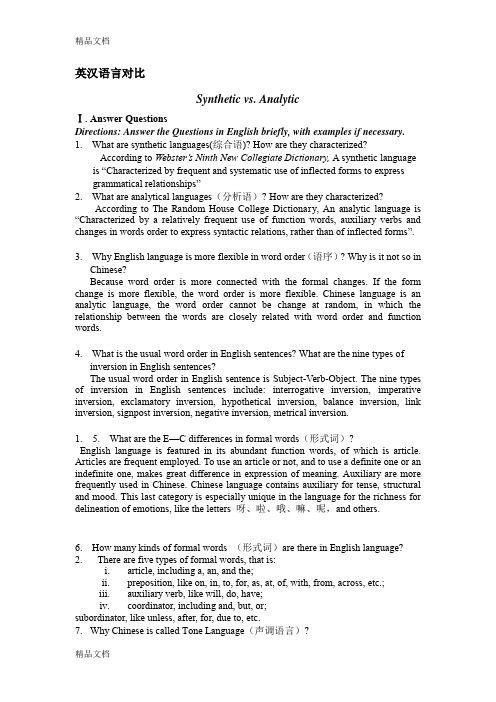
英汉语言对比Synthetic vs. AnalyticⅠ. Answer QuestionsDirections: Answer the Questions in English briefly, with examples if necessary. 1.What are synthetic languages(综合语)? How are they characterized?According to Webster’s Ninth New Collegiate Dictionary, A synthetic language is “Characterized by frequent and systematic use of inflected forms to express grammatical relationships”2.What are analytical languages(分析语)? How are they characterized?According to The Random House College Dictionary, An analytic language is “Characterized by a relatively frequent use of function words, auxiliary verbs and changes in words order to express syntactic relations, rather than of inflected forms”.3.Why English language is more flexible in word order(语序)? Why is it not so inChinese?Because word order is more connected with the formal changes. If the form change is more flexible, the word order is more flexible. Chinese language is an analytic language, the word order cannot be change at random, in which the relationship between the words are closely related with word order and function words.4.What is the usual word order in English sentences? What are the nine types ofinversion in English sentences?The usual word order in English sentence is Subject-Verb-Object. The nine types of inversion in English sentences include: interrogative inversion, imperative inversion, exclamatory inversion, hypothetical inversion, balance inversion, link inversion, signpost inversion, negative inversion, metrical inversion.1. 5.What are the E—C differences in formal words(形式词)?English language is featured in its abundant function words, of which is article. Articles are frequent employed. To use an article or not, and to use a definite one or an indefinite one, makes great difference in expression of meaning. Auxiliary are more frequently used in Chinese. Chinese language contains auxiliary for tense, structural and mood. This last category is especially unique in the language for the richness for delineation of emotions, like the letters 呀、啦、哦、嘛、呢,and others.6.How many kinds of formal words (形式词)are there in English language?2.There are five types of formal words, that is:i.article, including a, an, and the;ii.preposition, like on, in, to, for, as, at, of, with, from, across, etc.;iii.auxiliary verb, like will, do, have;iv.coordinator, including and, but, or;subordinator, like unless, after, for, due to, etc.7.Why Chinese is called Tone Language(声调语言)?Chinese tone can be used for indicating the change of meaning and is not suitable for expressing the certainty, completeness, independence or finality.Ⅱ. Fill in the BlanksDirections: Fill in the blanks with the best answer you have found in the textbook.1.11.综合语的特征是经常性、系统性的运用曲折形式来表现语法关系为特征的语言,分析语的特征是分析语的特征是相对频繁地使用功能词,助词和改变词序来表达句法关系,而不用曲折形式来表达。
英汉语言对比练习

班级:姓名:学号:序号:
根据相关英汉语言对比知识回答下列问题:
1.英汉语动词在语法意义和造句作用方面有什么差异?此种差异对翻译和第二
语言习得有什么借鉴意义?
2.如何理解英语重形合、汉语重意合?英汉语此种特征对翻译有什么指导意
义?
3.什么是异化和归化?在语际转换过程中,异化原则和归化原则可用于解决那
些问题?
4.英汉语合成构词有什么区别?其各自的特点对于翻译实践有何意义?
5.英汉语语序有何差异?
6.为什么说英语是树状结构语言而汉语是竹状结构语言?此种差异对英汉互译有什么样
的启示?
7.如何理解英语是静态语言而汉语是动态语言?举例说明此种差异对翻译的指导意义。
8.什么是话题和评论?如何理解汉语多话题-评论型句式而英语多主语-谓语型句式?举例
说明。
9.英汉名词的语法功能之间的差异是什么?
10.为什么有些语言学家认为英语是综合-分析语?
11.试从英汉思维差异说明说明为什么英语多物称主语,而汉语多人称主语?
12.英汉定语的位置和词序有何差异?
13.“祈使句+陈述”能表示哪些意义?
14.什么情况下英语要使用被动句?
15.英汉社会差异有何差异?。
英汉对比-练习题

Chapter 1Ⅰ. Answer QuestionsDirections: Answer the Questions in English briefly, with examples if necessary.1.What are synthetic languages(综合语)? How are they characterized?2.What are analytical languages(分析语)? How are they characterized?3.How man formal changes are possible to English words? Is there anyformal change(形态变化) in Chinese language?4.Why English language is more flexible is word order(语序)? Why isit not so in Chinese?5.What is the usual word order in English sentences? Which are the ninetypes of inversion in English sentences?6.What are the E—C differences in formal words(形式词)?7.How many kinds of formal words (形式词)are there in English language?8.How is English phonological system(语音系统) formed? How is Chineseone?9.Does Chinese phonological and characteristic system have anyadvantage in literary forms?10.Why Chinese is called Tone Language(声调语言)?Ⅱ. Fill in the BlanksDirections: Fill in the blanks with the best answer you have found in the textbook.11.综合语的特征是,分析语的特征是。
英汉对比研究试题答案
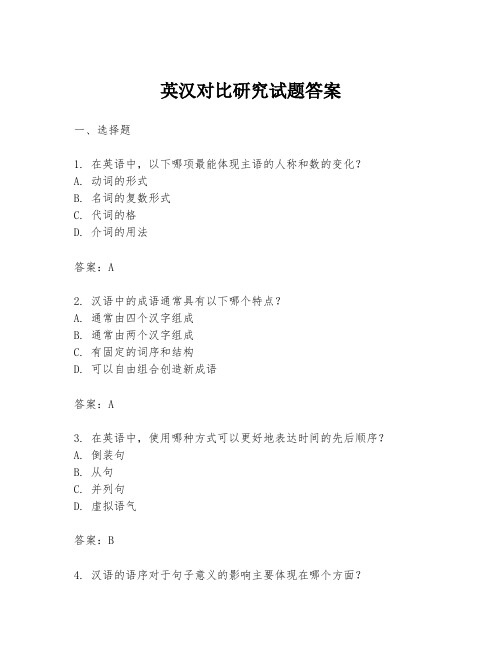
英汉对比研究试题答案一、选择题1. 在英语中,以下哪项最能体现主语的人称和数的变化?A. 动词的形式B. 名词的复数形式C. 代词的格D. 介词的用法答案:A2. 汉语中的成语通常具有以下哪个特点?A. 通常由四个汉字组成B. 通常由两个汉字组成C. 有固定的词序和结构D. 可以自由组合创造新成语答案:A3. 在英语中,使用哪种方式可以更好地表达时间的先后顺序?A. 倒装句B. 从句C. 并列句D. 虚拟语气答案:B4. 汉语的语序对于句子意义的影响主要体现在哪个方面?A. 主谓一致B. 修饰语的位置C. 动词的时态D. 名词的数答案:B5. 英语中的动词时态主要用来表达什么?A. 说话者的情绪B. 动作发生的时间和状态C. 句子的连贯性D. 语气的强度答案:B二、填空题1. 在英语中,第三人称单数的现在时动词通常需要在词尾加上________。
答案:-s2. 汉语中的量词用于表示事物的数量,而在英语中,通常使用________来表示类似的功能。
答案:冠词3. 英语中的虚拟语气多用于表达非现实情况,如假设、建议等,而在汉语中,通常使用________来表达类似的语气。
答案:情态动词4. 汉语中的成语往往具有深厚的文化内涵和历史背景,而在英语中,相应的表达方式可能是________。
答案:习语或idiom5. 英语中的名词有可数和不可数之分,而在汉语中,名词通常可以通过________来表示数量。
答案:量词三、简答题1. 请简述英语中的被动语态及其用法。
答:被动语态是英语中的一种语态,用来强调动作的承受者而非执行者。
它通过使用“be”动词的适当形式加上主动语态动词的过去分词来构成。
被动语态常用于当动作的执行者未知、不重要或希望突出动作承受者时。
2. 汉语中的“把”字句和“被”字句有什么区别?答:“把”字句和“被”字句都是汉语中用来表示动作和受事的结构。
不同之处在于,“把”字句强调动作的完成和受事的改变,通常用于有具体结果的情境;而“被”字句则强调受事的被动状态,不一定要求动作完成,更多地用于表达受事的遭遇或经历。
汉英对比考题版
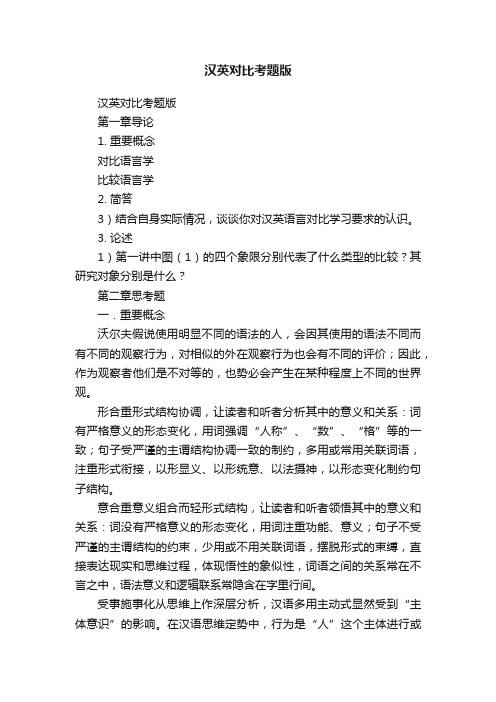
汉英对比考题版汉英对比考题版第一章导论1. 重要概念对比语言学比较语言学2. 简答3)结合自身实际情况,谈谈你对汉英语言对比学习要求的认识。
3. 论述1)第一讲中图(1)的四个象限分别代表了什么类型的比较?其研究对象分别是什么?第二章思考题一.重要概念沃尔夫假说使用明显不同的语法的人,会因其使用的语法不同而有不同的观察行为,对相似的外在观察行为也会有不同的评价;因此,作为观察者他们是不对等的,也势必会产生在某种程度上不同的世界观。
形合重形式结构协调,让读者和听者分析其中的意义和关系:词有严格意义的形态变化,用词强调“人称”、“数”、“格”等的一致;句子受严谨的主谓结构协调一致的制约,多用或常用关联词语,注重形式衔接,以形显义、以形统意、以法摄神,以形态变化制约句子结构。
意合重意义组合而轻形式结构,让读者和听者领悟其中的意义和关系:词没有严格意义的形态变化,用词注重功能、意义;句子不受严谨的主谓结构的约束,少用或不用关联词语,摆脱形式的束缚,直接表达现实和思维过程,体现悟性的象似性,词语之间的关系常在不言之中,语法意义和逻辑联系常隐含在字里行间。
受事施事化从思维上作深层分析,汉语多用主动式显然受到“主体意识”的影响。
在汉语思维定势中,行为是“人”这个主体进行或完成的,“事”或“物”不可能自己去进行或完成任何行为,再加上汉语言文字上并不具备这种给以“说明”的形态手段,因此表现为广泛的“受事施事化”。
1、汉语缺乏像英语那样的词缀虚化手段,因而常常用比较具体的方式来表达抽象的意义。
那么汉语可采用什么样的手段来表达英语的抽象词义呢?试举例说明。
汉语往往采用如下的手段表达英语的抽象词义:A:动词取代抽象名词He had surfaced with less visibility in the policy decisions.在决策过程中,他已经不那么抛头露面了。
B:范畴词使抽象概念具体化范畴词(category word)用来表示行为、现象、属性等概念所属的范畴,是汉语常用的特指手段:What they wanted most was an end of uncertainties.那时他们最渴望的就是结束这摇摆不定的局面。
英汉对比考试题及答案高中

英汉对比考试题及答案高中一、选择题1. 在英语中,"apple"一词的中文意思是:A. 香蕉B. 苹果C. 橘子D. 梨答案:B2. 在汉语中,“老师”一词在英语中通常翻译为:A. StudentB. TeacherC. DoctorD. Nurse答案:B3. 英语中的“Hello”在汉语中通常翻译为:A. 再见B. 你好C. 晚安D. 早上好答案:B4. 下列哪个词组在英语和汉语中意思相同?A. 吃一堑,长一智B. 一石二鸟C. 一箭双雕D. 一言难尽答案:C5. 英语中的“Homework”在汉语中通常指的是:A. 家庭作业B. 家务C. 家访D. 家庭答案:A二、填空题6. 英语中的“family”一词在汉语中可以翻译为“_______”。
答案:家庭7. 在汉语中,“学习”一词在英语中可以翻译为“_______”。
答案:study 或 learn8. 英语中的“Thank you”在汉语中通常翻译为“_______”。
答案:谢谢9. 汉语中的“朋友”在英语中可以翻译为“_______”。
答案:friend 或 friends10. 英语中的“Good morning”在汉语中通常翻译为“_______”。
答案:早上好三、翻译题11. 请将下列英语句子翻译成汉语:- "What's your name?"- "Where are you from?"- "How are you doing?"答案:- 你叫什么名字?- 你来自哪里?- 你最近怎么样?12. 请将下列汉语句子翻译成英语:- 你今天过得怎么样?- 我很高兴见到你。
- 明天见。
答案:- How was your day?- I'm very happy to meet you.- See you tomorrow.四、简答题13. 请简述英语和汉语在语法结构上的主要差异。
英汉对比试题及答案

英汉对比试题及答案一、选择题1. 下列哪个选项是英语中“书”的对应词?A. ChairB. BookC. DeskD. Pen答案:B2. 在汉语中,“红色”对应的英语单词是什么?A. BlueB. RedC. GreenD. Yellow答案:B3. 英语中表示“学习”的动词是什么?A. PlayB. LearnC. WorkD. Rest答案:B4. “老师”在英语中怎么说?A. TeacherB. StudentC. DoctorD. Nurse答案:A5. 下列哪个短语在英语中表示“在周末”?A. At weekendB. On weekendC. In weekendD. During the weekend答案:D二、填空题6. 英语中“早上好”是 _______。
答案:Good morning7. “谢谢你的帮助”在英语中可以表达为 _______。
答案:Thank you for your help8. “我来自中国”用英语怎么说?答案:I come from China / I am from China9. “他喜欢游泳”在英语中的正确表达是 _______。
答案:He likes swimming10. “明天见”的英文表达是 _______。
答案:See you tomorrow三、翻译题11. 将下列汉语句子翻译成英语。
“他每天骑自行车上班。
”答案:He rides his bike to work every day.12. 将下列英语句子翻译成汉语。
“She is a teacher at the university.”答案:她是大学里的一位老师。
13. 翻译下列英语短语。
“Take care of yourself.”答案:照顾好自己。
14. 将下列汉语句子翻译成英语。
“这个周末我们打算去爬山。
”答案:We plan to go hiking this weekend.15. 翻译下列英语句子。
英汉语言对比(二)练习答案
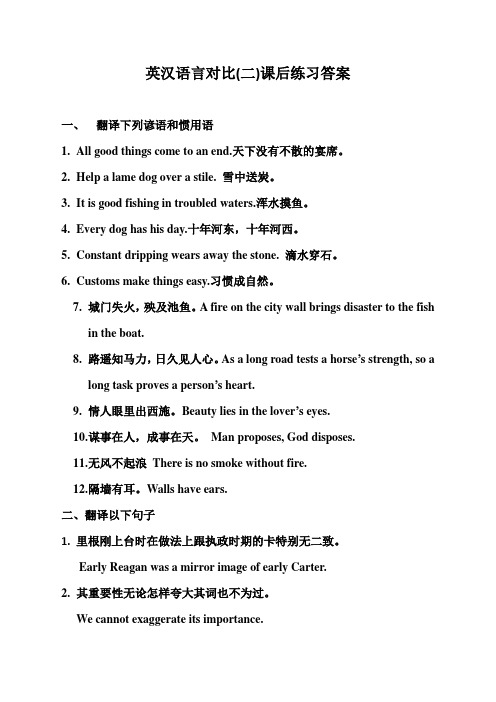
英汉语言对比(二)课后练习答案一、翻译下列谚语和惯用语1.All good things come to an end.天下没有不散的宴席。
2.Help a lame dog over a stile. 雪中送炭。
3.It is good fishing in troubled waters.浑水摸鱼。
4.Every dog has his day.十年河东,十年河西。
5.Constant dripping wears away the stone. 滴水穿石。
6.Customs make things easy.习惯成自然。
7.城门失火,殃及池鱼。
A fire on the city wall brings disaster to the fishin the boat.8.路遥知马力,日久见人心。
As a long road tests a horse’s strength, so along task proves a person’s heart.9.情人眼里出西施。
Beauty lies in the lover’s eyes.10.谋事在人,成事在天。
Man proposes, God disposes.11.无风不起浪There is no smoke without fire.12.隔墙有耳。
Walls have ears.二、翻译以下句子1.里根刚上台时在做法上跟执政时期的卡特别无二致。
Early Reagan was a mirror image of early Carter.2.其重要性无论怎样夸大其词也不为过。
We cannot exaggerate its importance.3.人的思想形成了语言,而语言又形成了人的思想。
Language is shaped by, and shapes human thought.4.人非圣贤,孰能无过;过而能改,善莫大焉。
To err is human and to mend is a supreme merit.5.明年我们不应再给农民打白条了。
英汉语言对比作业及答案

1. Not knowing her telephone number, I can not contact her immediately. 【译文】由于不知道她的电话号码,我无法立刻与她联系。
2. Ignorance is the mother of fear as well as of admiration.【译文】无知是恐惧的根源,也是敬佩的根源。
3. With all his achievements he remains modest and prudent.【译文】她虽有很多成就,但还是谦虚谨慎。
4. Everything considered, your essay seems better written.【译文】如果各方面都考虑到,你的论文似乎会写得更好些。
5. We maintain that no peace situation is permanent which does not take into account the legitimate wishes of the majority of the people of any country.【译文】我们认为,如果不尊重一个国家大多数人民的正当愿望,任何和平局面都不会是持久的。
6.。
A reader’s perception of the loose, slangy, colloquial, shirt-sleeved quality of much modern prose will be sharpened if he has experienced the conscious elegance of eighteenth-century writers and the solemn lecture-hall pronouncements of the Victorians. (按照逻辑顺序)【译文】如果一位读者读过18世纪作家的作品,体会到其刻意追求典雅的语言风格.又读过维多利亚女王时代的人在演讲大厅上所作的庄严的发言,他定能更深刻地理解很多现代散文作品那种结构松散、口语色彩浓、好用俚语、不拘形式的语言风格。
汉外语言对比试题及答案
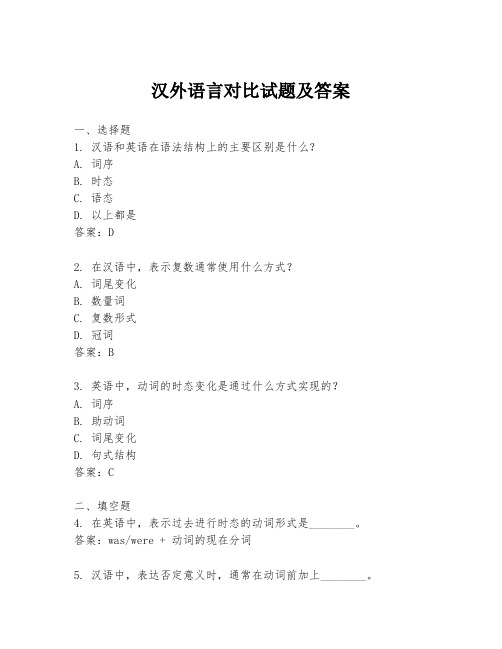
汉外语言对比试题及答案一、选择题1. 汉语和英语在语法结构上的主要区别是什么?A. 词序B. 时态C. 语态D. 以上都是答案:D2. 在汉语中,表示复数通常使用什么方式?A. 词尾变化B. 数量词C. 复数形式D. 冠词答案:B3. 英语中,动词的时态变化是通过什么方式实现的?A. 词序B. 助动词C. 词尾变化D. 句式结构答案:C二、填空题4. 在英语中,表示过去进行时态的动词形式是________。
答案:was/were + 动词的现在分词5. 汉语中,表达否定意义时,通常在动词前加上________。
答案:不6. 英语中,表示将来时态的动词形式是________。
答案:will + 动词原形三、简答题7. 请简述汉语和法语在语音方面的主要差异。
答案:汉语是一种声调语言,有四个声调,而法语没有声调。
汉语的音节结构相对简单,通常由一个音节组成一个词,而法语的音节结构较为复杂,一个词可能由多个音节组成。
8. 在英语中,如何使用情态动词表达可能性?答案:情态动词如can, could, may, might, will, would, shall, should等可以用来表达可能性。
例如,使用may表示可能性时,可以说:He may come to the party tonight.四、翻译题9. 请将以下汉语句子翻译成英语。
“他每天早晨都去公园散步。
”答案:He goes for a walk in the park every morning.10. 请将以下英语句子翻译成汉语。
"I don't think you should do that."答案:我认为你不应该那么做。
五、论述题11. 论述汉语和德语在词汇构成上的主要异同。
答案:汉语和德语在词汇构成上的主要异同体现在:汉语词汇多为单音节词,而德语词汇多为多音节复合词;汉语中存在大量同音异义词,而德语中同音异义词较少;汉语中词缀的使用较少,而德语中词缀的使用较为普遍,如动词的前缀和名词的后缀等。
英汉对比考试题库及答案

英汉对比考试题库及答案一、选择题1. 英语中,表示“和”的词是:A. AndB. OrC. ButD. So答案:A2. 汉语中,表示“但是”的词是:A. 但是B. 并且C. 然而D. 所以答案:A3. 在英语中,以下哪个词组表示“无论如何”?A. In any caseB. In any wayC. In any placeD. In any time答案:A4. 在汉语中,“无论如何”可以翻译为:A. 无论如何B. 无论如何都要C. 无论如何都不要D. 无论何时答案:A5. 英语中,表示“因为”的词是:A. BecauseB. SinceC. AlthoughD. If答案:A6. 汉语中,表示“因为”的词是:A. 因为B. 所以C. 尽管D. 然而答案:A二、填空题1. 英语句子 "I love you" 在汉语中可以翻译为 "________"。
答案:我爱你2. 汉语句子“他很聪明” 在英语中可以翻译为 "He is very________."。
答案:smart3. 英语中的 "Good morning" 在汉语中可以翻译为“________”。
答案:早上好4. 汉语中的“晚安” 在英语中可以翻译为 "________"。
答案:Good night三、翻译题1. 将下列英语句子翻译成汉语:- "I have a dream."答案:我有一个梦想。
2. 将下列汉语句子翻译成英语:- “她正在学习英语。
”答案:She is studying English.四、简答题1. 请简述英语和汉语在语法结构上的一个主要差异。
答案:英语和汉语在语法结构上的主要差异之一是英语强调词序和形态变化,而汉语则依赖于语序和语境来表达语法关系。
2. 请解释英语中的“虚拟语气”是什么,并给出一个例句。
汉英语言对比参考答案

汉英语言对比参考答案汉英语言作为世界上使用人数最多的两种语言,各自拥有独特的语言特点和丰富的文化内涵。
本文将从语音、词汇、语法、表达方式等方面对汉英语言进行对比分析,以期对两种语言的异同有一个全面的认识。
一、语音对比汉语属于汉藏语系,其语音系统以声母、韵母和声调为主。
汉语普通话有21个声母、39个韵母和4个声调,声调的变化可以改变词义。
例如,“妈”(mā)、“麻”(má)、“马”(mǎ)、“骂”(mà)。
英语属于印欧语系,其语音系统包括元音和辅音,没有声调的概念。
英语的发音更依赖于元音和辅音的组合,以及重音的分布。
例如,cat (猫)和bat(球棒)发音相似,但意义不同。
二、词汇对比汉语词汇以单音节词为主,每个音节都有意义,词汇的构成往往是通过词根和词缀的组合。
例如,“电”(diàn)可以与“视”(shì)组合成“电视”(diànshì),表示一种视觉媒介。
英语词汇则以多音节词为主,词汇的构成可以是词根、前缀、后缀的组合,也可以是复合词。
例如,“television”(电视)由“tele-”(远的)和“-vision”(视觉)组成,表示通过远距离传输的视觉媒介。
三、语法对比汉语的语法结构相对灵活,词序和虚词的使用是表达语法关系的主要手段。
例如,“我爱你”(Wǒ ài nǐ)和“你爱我”(Nǐ àiwǒ)通过改变词序来表达不同的主宾关系。
英语的语法结构则较为固定,依赖于词序和形态变化来表达语法关系。
例如,“He loves me”和“I love him”通过使用不同的助动词和宾格代词来表达主宾关系。
四、表达方式对比汉语表达往往含蓄,喜欢使用比喻、借代等修辞手法。
例如,“月有阴晴圆缺”(The moon has its phases of darkness and light)通过比喻表达人生的无常。
英语表达则相对直接,喜欢使用明喻和转喻等修辞手法。
- 1、下载文档前请自行甄别文档内容的完整性,平台不提供额外的编辑、内容补充、找答案等附加服务。
- 2、"仅部分预览"的文档,不可在线预览部分如存在完整性等问题,可反馈申请退款(可完整预览的文档不适用该条件!)。
- 3、如文档侵犯您的权益,请联系客服反馈,我们会尽快为您处理(人工客服工作时间:9:00-18:30)。
Chapter 2
Ⅰ. Answer Questions
15This is because English language has rigid rules on sentence structure centered on subject-predicate;English sentences are developed from subject-predicate structures.
16The simplest English sentence consists of only a subject and a predicate, based on which many components are attached or derived. And the verb is the core, the number of nouns attachable to the verb is called the verb’s valence. As Chinese language focuses on internal theme instead of external representation, Chinese sentences can hardly be classified according to verb variation like English sentences are
17SV, SVP,SVO, SVOO,SVOC
18Declarative, interrogative, imperative and exclamative.
19A) to add modifiers; B) to extend the elements in the basic sentence
a) grammatical concord; b) notional concord; c)principle of proximity
20It can be verbs, nouns, or adjectives; it can be one verb or more than one verbs or nor verbs; it can be one word or word phrases.
Nouns and pronouns (包括代词)
verbs:吃饭好
words referring to time, location, conditions:只有下定决心才行preposition:由你负责此事
phrases:我疯了怎么可能?我就这样怎么了?
21Theme sentences; transitive sentence; relative sentences;
exclamative sentence; existential sentence; ownership sentence;
descriptive sentence; and explicative sentence
22In summary, Chinese sentences are characterized in three uncertainties—Uncertainty of subject; uncertainty of predicate;
uncertainty in the relation between subject and predicate.
23Chinese sentence variation is embodied by large number of ambiguous sentences and full sentence and minor sentences. For example: 他欠你的钱;是前天发的电报;房间干干净净。
24Jespersen points out, analysis means suppleness, and synthesis means regidity; in analytic language you have the power of kaleidoscopically arranging and rearranging the elements that in synthetic forms are in rigid connexion.
Ⅱ. Fill in the Blanks
25名词性短语和动词性短语
26.主语+谓语;主语+动词+表语;主语+动词+宾语;主语+动词+
直接宾语+间接宾语;主语+动词+宾语+宾语补足语
27陈述句变疑问句;肯定句变否定句;主动句变被动句
28增加修饰语;扩展基本句型的成分
29语法一致、意义一致、就近原则
Ⅲ.Translate between E/C Languages
30妻子突然回家,使他感到很吃惊。
31离开时请顺手关门。
32谁污染谁负责。
33暴风雨袭击了这个村庄。
34违法者应受到惩罚。
35This bicycle is cheap and fine and sells well in Middle East.
36Chinese people were proud of their country with vast territory and abundant resources and great population in the past.
37I am a green hand in teaching translation for the senior students. 38The young men will decide for themselves for their marriage.
39Mother are fully conscious the worries in her daughter.
40I am still in the dark for this matter.
41As for money, I will try to borrow.
42The aim of reform is to develop the productive force.
43She likes Chinese painting.
44He nodded, indicating he heard what you said, but show sign of agreement or not.
45We firmly believe that our product will be welcomed in the European market.
46It is a great honor for me to participate in such a party today.
47An young man who talks and looks like American entered the car.
48To bear hardship before you enjoy the comforts.。
